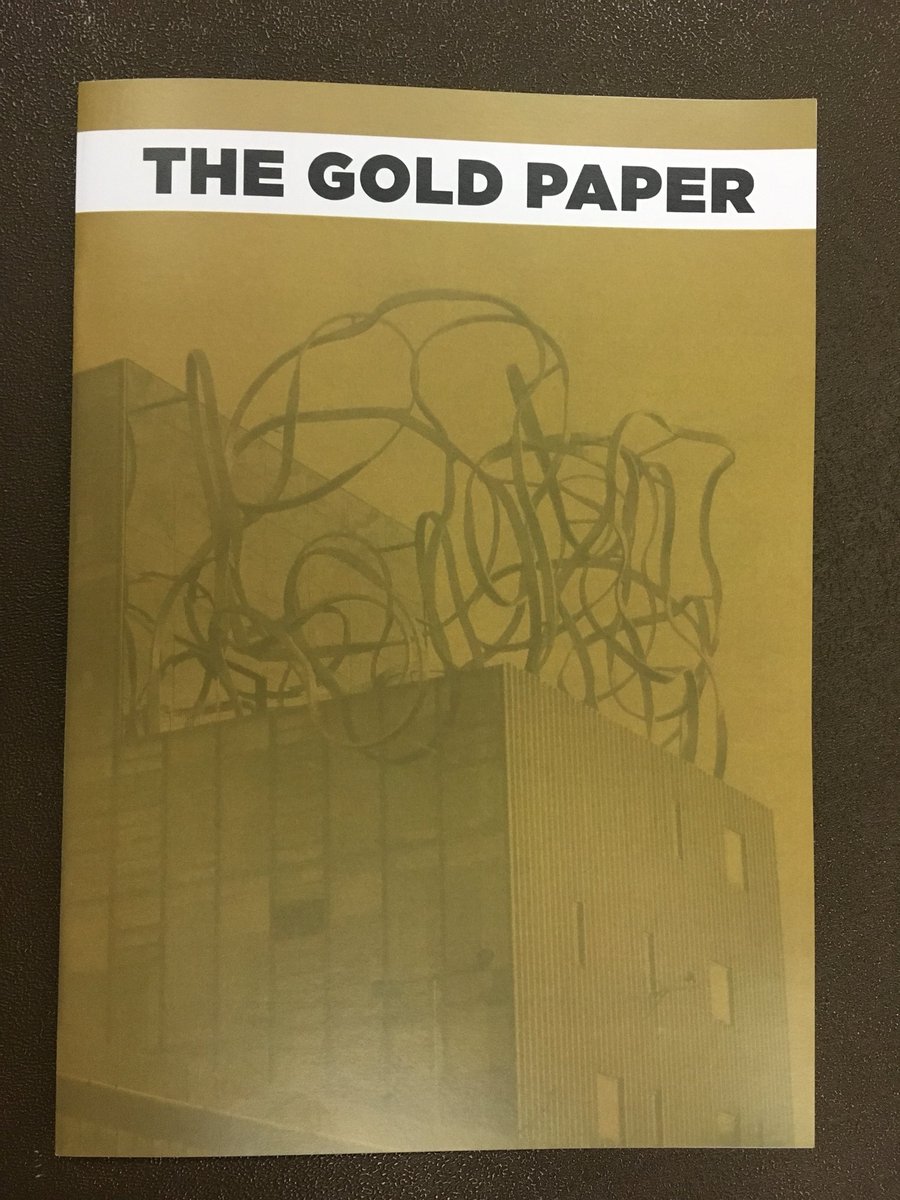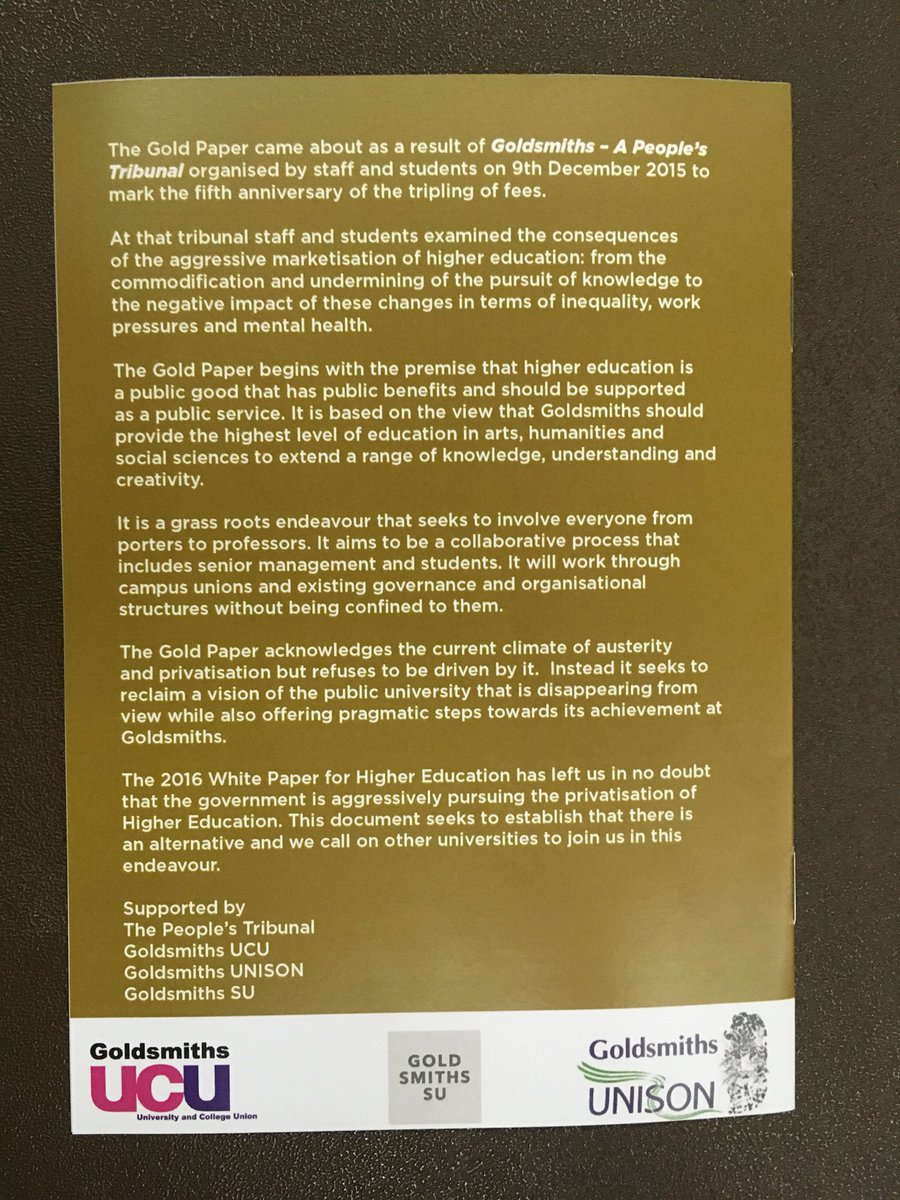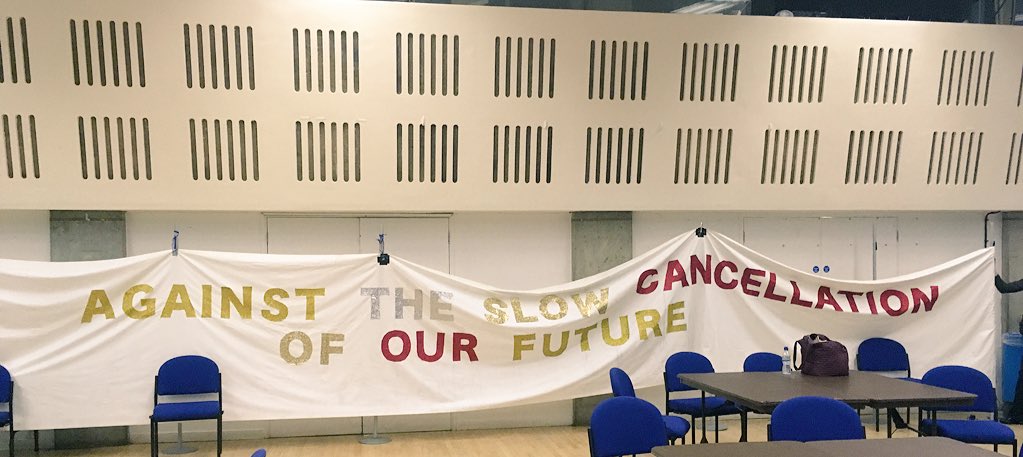What does it mean when VCs call themselves CEOs or ‘bosses’ of universities?
Now thinking critically about the Leadership Foundation in Higher Education - established by UUK - which embeds certain subjectivities in types, styles, personalities, approaches of HE leadership. lfhe.ac.uk
The role of (inappropriate) sports analogies and weird sexual or gendered language in VC culture - universities trying to push for the ‘champions league’, universities who need to ‘mate’ with similar institutions (David Willetts!)
During and after the #USSstrike, VCs were subject to a level of analysis and critique that they found unexpected and unwelcome: and they cast this critique as being unfair or even inappropriate.
So we need to keep up this critique! Read the masses of literature produced by your VC and university management! Analyse it, critique it!
We’re now thinking about transatlantic comparisons: how do universities in Britain compare to the US?
First up: there are a lack of safeguards in Britain to protect staff from their managements and we are not far away from a few top-down directives bringing our delicate infrastructure crashing down.
One big problem: universities in U.K. and US are NOT the same and attempts to import US structures/approaches are always going to be difficult/dangerous.
In the US there is no attempt to create a national standard in education: so no REF, no NSS, no external examiners (only external reviews). This isn’t going to change: but does explain why so much more work in U.K.
Tenure: incredibly stressful and problematic process BUT tenure means that staff cannot be controlled in teaching or research, they cannot be performance managed out, their departments cannot be closed.
Classroom autonomy in the US is SACROSANCT: department committees and managers cannot make any changes or interventions in the classroom at all. The classroom is the teacher’s domain. Not unproblematic: but staff are treated as EXPERTS who know best how to teach their material.
US contracts are clearer, firmer, based on more obvious workload model and do not allow for expansion of teaching: they state precisely how much you will teach and if you teach more, you HAVE to be paid a per-course rate on top of contracted salary.
US students are thought to be entitled and litigious - but in the U.K. we are actively cultivating this through the focus on student satisfaction tied to their courses and teaching (rather than in US more general college experience)
In the U.K. we are pitting students against staff needs and staff conditions: and this is not actually conducive to student learning!!
As individual academics we often think that our institution is doing things in the worst possible way: and the strike showed us that actually it’s a sector problem not an institution problem.
The importance of contracts - and particularly open-ended contracts, that simply tell us to work until our work is finished - came through in the strike and ASOS.
Now we’re thinking about ableism in academia. Why do so few academics declare their long term conditions to their employers: what is happening in academia to make it so ableist?
Academia is generally considered to be elitist and privileged, but it also includes many people on the peripheries and on the margins. The legacy of the strike needs to be that we truly reshape academia, challenging basic assumptions.
Self-advocacy for access to work adjustments requires money and energy: having a time consuming and difficult conversation about your needs makes it hard or impossible to do other aspects of your job.
Need a shift in attitude. Sign language interpreters are not there because of D/deaf colleagues’ needs - they are there because so many people can’t sign. Need to reframe the ‘problem’.
Thinking about demands coming from these issues: need to think about relationship between universities, neoliberalism and disability.
Now talking about race and racism in UK academia: BME academics make up very small percentages of university staff and are disproportionately in low paid positions.
There are lots of issues around (in)equality in academia: race and ethnicity, representation, casualisation and precarity, access to power (both within the union and within universities).
The recall of UCU Congress in October provides an opportunity to raise some of these issues around inequalities and other structural issues in academia.
The gender pay gap reports for universities - almost every institution had a distinct gender pay gap (and this can/should also be analysed by race, too): so what should we do with this data??
Watching a message from the DINOSAUR OF SOLIDARITY 🦕 🦖💪
Thinking about the Gold Paper: produced over the last 3-4 years from Goldsmiths ‘people’s tribunal’, arising from a real sense of necessity from the *harm* being done to students and staff. 



University staff are feeling harm and anxiety but also - as @garyyounge said on the Goldsmiths picket line - a sort of revolutionary love. Which we can work with!
Thinking critically about university governance and how governance has become centralised, undemocratic, unaccountable and dictatorial. It needs to be shared, collaborative, open.
The strike encouraged us all to think in visionary, futuristic, collaborative ways about how to reclaim our universities.
The Goldsmiths document is evidence based and action driven. Important principles. Get good at FOIs! Use your analytical skills! Ask for real data not simply headline figures.
For example: gender pay gap data might be less important than information about promotions process. Think about what we actually NEED to know.
Think about GOOD PRACTICE examples from other universities. For example, VC in Dublin is elected. In Europe, lots of institutions elect senior management. So we know it works - can provide evidence - and we can ask for it.
Now thinking about the public university campaign: check them out at @public_uni
Democratising the university: think about how to use the staff surveys that so frequently illustrate real unhappiness among staff at all levels
There are provisions within the UNESCO recommendations on status of teachers in HE which see academic representation on university governance as central to good practice. Point this out to your university!
Open email lists can be useful for campus unions to keep democratic discussions open - a space for debate and for raising issues.
It can be critical to establish principles like - for example - heads of departments being selected from within departments rather than hired in.
But what do you do once you HAVE these democratic academic structures - how do you keep people engaged, active and participatory?
It’s easy to get people involved in campaigns when they are angry, but when people are miserable, busy or complacent, it can be hard to sustain momentum.
Activist research in public: how has the system actually been functioning?! The strike allowed many of us to start putting pieces together.
Reading Adam Tickell’s work on neoliberalism, following his role as VC of Sussex during the strike, was deeply dispiriting, and angering. Why would he embrace the TINA logic? How can we understand his shift?!
Collective work of - for example - human geographers to do research in public during the strike: e.g. the work to uncover the Aon Hewitt briefing that tried to discredit DB pensions.
‘Citizen research’ - akin to ‘citizen science’ - to try to FOI documents, uncover paper trails, explore historic university consultancy reports, etc
UUK, universities (and indeed gov.uk) are not transparent with archival practices - policies are easily ‘lost’ - need to think like *researchers* and use our skills to uncover this stuff.
Highlighting @USSbriefs as a way to share, collaborate, disseminate our knowledge about HE to reframe and reshape academia. Including using humour and MEMES.
People including @NicholasGuyatt pointed out the paper-folders-stock-photo style of USS, and it was easy for @USSbriefs to use the style for critical parodies.
Highlighting @gailfdavies work in research and uncovering some of these critical narratives, and @acupunctureUSS in creating memes and critical images.
Finally, thinking about the histories of activism and how to build radical cultures in uncongenial times.
Movements are people, and keeping affective networks and connections going within activist communities is vital in terms of sustaining activism.
Why did having time to talk to each other on the picket line feel so radical? Because we need this collegial experience. We need to protect our shared spaces as well as our private research spaces.
Online spaces can be important but we need physical spaces: for example a common room, a coffee morning, a space to build community.
Don’t force people to do more emotional labour but do reach out to colleagues, especially new colleagues, especially those on short term contracts.
Stuart Hall’s CCCS was famous for collaborative working practices, for spaces of critical solidarity - but he was concerned in the 70s it had devolved into lazy niceness. BUT kindness can be radical!
Finishing off with the Sussex Strike Singers: it’s not a radical movement without a song, after all.
We’ve been @we_are_the_uni: this has been a joyous, angry, inspiring evening. Now to work to keep the conversation going. 

• • •
Missing some Tweet in this thread? You can try to
force a refresh




